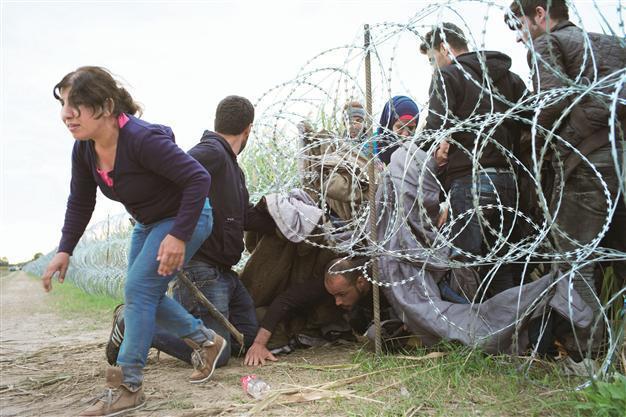Hungary moves to secure border with more men, dogs, gas
ROSZKE - Reuters

Syrian refugees cross into Hungary underneath the border fence on the Hungarian - Serbian border near Roszke, Hungary on Aug. 26, 2015. AP Photo
Hungary has outlined plans to send the army, mounted police and dogs to its southern border to confront record numbers of migrants streaming into the European Union, many fleeing war in Syria.Unrest flared briefly at a crowded reception center in the border region of Roszke, with a police spokesman saying tear gas had been fired.
Police said a record 2,533 migrants - most of them from Syria, Afghanistan and Pakistan - were caught entering Hungary from Serbia on Aug. 25. Another 1,300 were detained just by 9.30 a.m. on Aug. 26.
More will have passed unnoticed, walking through gaps in an unfinished barrier to a Europe groping for answers to its worst refugee crisis since World War Two.
Hungary, which is part of Europe’s Schengen passport-free travel zone, is building a fence along its 175-km (110-mile) border with Serbia in a bid to keep them out.
Government spokesman Zoltan Kovacs said parliament would debate next week whether to deploy the army.
“Hungary’s government and national security cabinet ... has discussed the question of how the army could be used to help protect Hungary’s border and the EU’s border,” Kovacs said.
Authorities said over 140,000 migrants had entered Hungary from Serbia to far this year. The numbers travelling through the Balkans have soared in recent weeks, with 3,000 crossing into Macedonia daily from Greece then whisked by train and bus north to Serbia and beyond.
The chief commissioner of Hungarian police, Karoly Papp, said police were readying six special border patrol units of an initial 2,106 officers, equipped with helicopters, horses and dogs, to be sent in depending on the situation on the Serbian border.
“They don’t have and will not get an order to shoot,” Papp told a news conference.
In Roszke, the police spokesman said some 200 migrants at the reception centre where unrest flared had refused to be fingerprinted.
Almost all hope to reach the more affluent countries of northern and western Europe such as Germany and Sweden, but being fingerprinted in Hungary means that, under EU rules, they risk being returned to Budapest if caught.
Embroiled in a debilitating economic crisis, Greece has taken to ferrying mainly Syrian migrants from its overwhelmed islands to Athens. Some 50,000 hit Greek shores by boat from Turkey in July alone.
Serbia said around 10,000 migrants were passing through the country at any time, their stay lengthening as Hungary nears completion of its border fence.
“The situation will get worse, when winter arrives. We’re getting ready to look after double that number,” Serbian Prime Minister Aleksandar Vucic told the Frankfurter Allgemeine Zeitung.
















